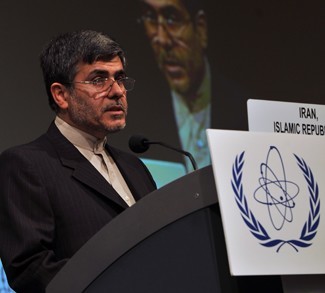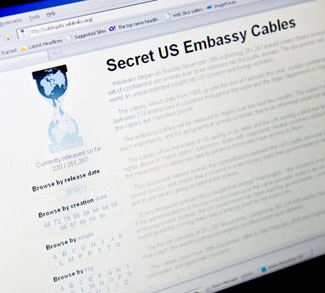FORECAST
The Iranian government’s plan to construct ten new uranium enrichment plants has put prospects for a diplomatic solution on life support.
Sunday’s announcement isn’t the only evidence to suggest that the Iranian government has decided to brave international isolation and not allow its uranium enrichment activities to be regulated by the IAEA. Last week, Tehran wrapped up a high-profile series of military exercises meant to defend Iran’s nuclear sites from outside attack. The message in these exercises, and to whom it is directed, needs no explanation.
Tehran has also tightened its belt economically in preparation for expanded sanctions. The Ahmadinejad government recently ended Iran’s massive $100 billion gas subsidies. This decision not only allows the government to directly distribute the resulting savings to Ahmadinejad’s rural and urban poor support base, but also helps to wean the Iranian population off of gasoline overconsumption by allowing the price to float upwards.
That the Iranian government has decided to push forward with uranium enrichment and risk international isolation should not come as much of a surprise. Ever since last June’s election brought societal divides to the surface, the Ahmadinejad government has relied on using international isolation to justify an ongoing internal crackdown. The nuclear program has simply taken on too much symbolic importance for Iranian nationalism. To give it up would not only jeopardize Mahmoud Ahmadinejad’s political career, but possibly even the Islamic Revolution as well.
President Obama now finds himself faced with an exceedingly difficult situation. He has already sunk a great deal of political capital by stressing diplomacy and taking a relatively soft line on Iran’s nuclear program. Now, with nothing to show for his temperance and an outwardly belligerent Iranian partner, President Obama is under pressure to prove that a willingness to use force underpins his relatively benign foreign policy.
His first move will be to rally support within the UN Security Council for a new round of sanctions on Iran’s gas industry. Given Iran’s brazenly defiant behavior, it is likely that Russia can be persuaded to support the motion. This would leave China as sole dissenter on the wrong side of an international consensus, a position that the Chinese government has historically tried to avoid.
How Beijing proceeds will be governed by their perception of American resolve. Even though Iran is China’s third-largest supplier of oil, Chinese officials are cognizant of the fact that sanctions may be the only way to forestall military action against Iran. If Beijing is convinced that President Obama is willing to give the nod to Israel to strike Iranian nuclear facilities, they may support a strong sanction regime on the Iranian gas industry in the hope that true isolation might cause Tehran to come back from the brink.
Given the strategic importance of energy security, an expanded sanctions regime should be expected to at best be circumvented, at worst be ignored by energy-hungry states and smugglers.
Moving forward, expect Washington to bribe, pressure, or coerce whoever it takes to deploy a strong new sanction regime on Iran. While the logistical difficulties involved in an attack on Iranian nuclear facilities remain a strong incentive to go the route of sanctions, given President Obama’s compromised political position, an attack is no longer impossible.
SUMMARY OF EVENTS: November 23 – 30, 2009
WORLD
Gold prices surged to another new record Wednesday and other commodity prices also rallied as the dollar weakened.
Sovereign wealth funds from Kuwait, Qatar and the UAE are poised to pour billions of dollars into the markets of Brazil, Russia, India and China next year as they seek to tap into the BRIC countries explosive economic growth, a senior executive at Credit Suisse said.
NORTH AMERICA
Canada
Canada remains ready to defend its Arctic border against nations that would “push the envelope,” Foreign Affairs Minister Lawrence Cannon said Friday.
United States
The White House said President Barack Obama could use an unusual evening war council session Monday to lock in his long-awaited decision on whether to commit tens of thousands of new U.S. forces to the stalemated war in Afghanistan.
President Obama said Tuesday that he was determined to “finish the job” in Afghanistan, and his aides signaled to allies that he would send as many as 25,000 to 30,000 additional American troops there even as they cautioned that the final number remained in flux.
The United States is scrambling to coax NATO allies to send 10,000 additional troops to Afghanistan as part of President Obama’s strategy for the region. Those countries appear willing to provide fewer than half that number, American and allied officials said Wednesday.
Hundreds, if not thousands, of lobbyists are likely to be ejected from federal advisory panels as part of a little-noticed initiative by the Obama administration to curb K Street’s influence in Washington, according to White House officials and lobbying experts.
CENTRAL AMERICA & THE CARIBBEAN
Honduras
Honduras’ Supreme Court ruled on Wednesday that ousted President Manuel Zelaya cannot legally return to office, dimming the possibility of his reinstatement after a June coup, court sources said.
SOUTH AMERICA
Brazil
Brazil will not recognize the winner of this weekend’s election in Honduras as a legitimate president, Brazilian Foreign Minister Celso Amorim said on Thursday, setting the stage for a potential showdown with Washington.
Brazil’s president said that “gringos” should pay Amazon nations to prevent deforestation, insisting rich Western nations have caused much more past environmental destruction than the loggers and farmers who cut and burn trees in the world’s largest tropical rain forest.
WESTERN EUROPE
Britain
British officials privately discussed the prospect of “regime change” in Iraq in late 2001 – more than a year before the invasion – the Iraq War inquiry was told Tuesday.
Intelligence that Saddam Hussein did not have access to weapons of mass destruction was received by the Government ten days before Tony Blair ordered the invasion of Iraq, the inquiry into the war was told Tuesday.
Germany
Gen Wolfgang Schneiderhan, the head of the German armed forces, has resigned after being accused of suppressing evidence showing civilians had been killed in an Afghan air strike.
EASTERN EUROPE
Romania
After Romanians went to polls to help their country emerge from a political and economic crisis, the election becomes overshadowed allegations of vote fraud.
MIDDLE EAST
Iran
A top Iranian military official said Tuesday Tehran may respond to Moscow’s failure to fulfill the S-300 delivery contract through legal action.
Iran could consider sending its low-enriched uranium abroad, the Foreign Ministry said on Tuesday, apparently softening its opposition to a U.N. plan aimed at keeping a check on its nuclear ambitions.
Islamic religious authorities have begun tightening their grip on Iranian public schools, a report said Wednesday, as hard-liners expand an ideological “soft war” against Western influence.
The UN nuclear watchdog’s governing body has voted overwhelmingly to censure Iran for developing a uranium enrichment site in secret, and has demanded it freeze the project immediately.
Iraq
Iraq’s parliament on Monday approved an amended law needed to hold an election next year, but the new text risks being vetoed a second time — which could delay both the vote and next year’s partial U.S. troop withdrawal.
Iraq will be unable to hold a national election in January as planned, a poll official said on Tuesday, heaping more uncertainty on a vote meant to cement democracy and pave the way for a partial U.S. troop withdrawal.
Israel
Israel and the Islamist group Hamas appeared Monday to be nearing a deal to exchange a captured Israeli soldier for hundreds of Palestinian prisoners, possibly including a popular leader, a move with far-reaching implications not only for stalled Middle East peace talks but for a range of regional relations.
An Israeli prisoner exchange with Hamas has not yet been agreed and may not happen, Prime Minister Benjamin Netanyahu said on Tuesday, after a senior cabinet colleague predicted a breakthrough within weeks.
Israel’s prime minister has announced a 10-month suspension to the construction of new settlement houses in the occupied West Bank.
United Arab Emirates
World stock markets were rocked Thursday after the government of Dubai announced a reorganization of its debt-laden economic development agency.
EAST ASIA
China
Beijing on Monday criticized a U.S. government report that said Chinese spies are aggressively stealing American secrets, saying the report was “full of prejudice” and warning that it could damage U.S.-China relations.
SOUTH ASIA
Afghanistan
Two Afghan cabinet ministers are under investigation for alleged corruption, the attorney general’s office has said.
Pakistan
Pakistan charged seven men in last year’s Mumbai attacks on Wednesday, its first indictment in a case being monitored by India and the United States to see if Islamabad makes good on promises to bring those responsible to justice.
Villagers in nearby districts report an influx of militants escaping the Pakistan army offensive in South Waziristan, a campaign critics say should not have been announced ahead of time.
A key anti-Taliban tribal leader was assassinated Friday in a roadside bombing, the latest in a series of attacks against pro-government militias in the Afghan border area of northwestern Pakistan.
Philippines
Hundreds of extra troops were deployed in the southern Philippines after gunmen believed linked to a local politician kidnapped and killed at least 22 people, a military spokesman said Tuesday.
A state of emergency was declared in parts of the Philippines on Tuesday as 24 bodies were discovered in a shallow grave, bringing the death toll from a politically-motivated massacre on Monday to 46.
The lead suspect accused of masterminding the massacre of at least 57 people in the Philippines has turned himself in to police, officials said Wednesday.
AFRICA
South Africa
South Africa has deported an Israeli airline official following allegations that Israel’s secret police, Shin Bet, have been operating in Johannesburg’s international airport.




